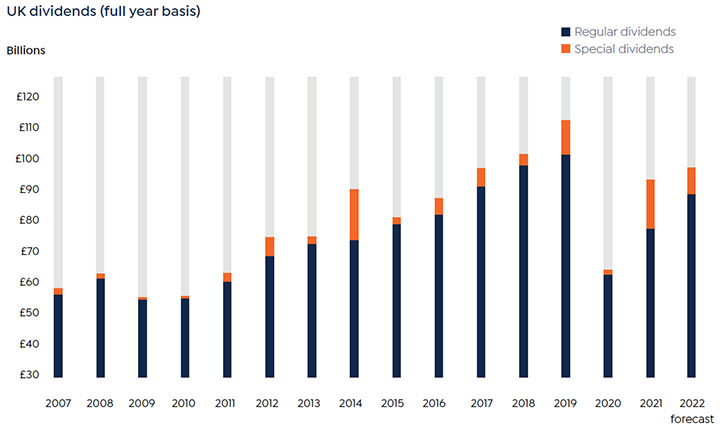
At the start of this year, investors were worried mainly about inflation. Now, as the midpoint of the year has passed, they’re worried about inflation AND recession. US GDP figures are due this week and the IMF has just made (another) gloomy prognosis in its World Economic Outlook. How worried should income investors be? While many dividend paying stocks come from defensive and less growth-focused sectors of the economy, a wider slowdown will inevitably have an impact on earnings and the ability of companies to pay dividends.
Pessimists will say that firms slashed payouts in 2020, and they will do so again under pressure in recession. “Nothing can be taken for granted, especially if recession hits,” argues AJ Bell investment director Russ Mould. Optimists would argue that 2023 can’t be as bad as 2020, and that the risk of recession is already being priced in to many of the more cyclical sectors.
Link’s latest quarterly Dividend Monitor, released today, forecasts a decent year for UK dividends in 2022 but looks ahead to a more challenging environment next year. “As we move into 2023, headwinds will strengthen. The easy post-pandemic catch-up effects are soon to wash entirely out of the figures, and an economic recession will crimp the ability and willingness of many companies to grow dividends,” says Link’s Ian Stokes, managing director, corporate markets UK and Europe. Mining companies have been the engine of the post-pandemic recovery, paying generous ordinary and special dividends as commodity prices have soared. That boom is likely to have peaked, Link says, and will lead to a slowdown in UK dividend growth going forward – although banks are likely make up some of that shortfall.

Link has actually upgraded its forecast for 2022 payouts since its last quarterly update. It now expects headline dividends, which include specials, to rise to £96.3 billion, a year-on-year rise of 2.4% on 2021 levels, while underlying payouts to jump 12.5% to £86.8 billion. A weak pound has also helped to flatter the figures. Looking at the annual figures going back to 2007, a few elements are clear: 2020’s slump was such an outlier over the last decade, one that investors hope will not be repeated; the reliance on special dividends is likely to lessen this year; and annual dividends are still a way off the 2019 peak. So there’s an argument that dividends are on a more solid footing than before the pandemic struck. Companies like BT (BT.), which has just restored its payout for the first time since 2020, will be reluctant to take the axe to the payout again however tough things get. “The really difficult period in 2020 and 2021 is behind us,” argues Stuart Rhodes, manager of M&G Global Dividend.
Finding the Survivors
Rhodes is realistic about the prospect of dividend cuts in a recession but insists that some sectors are more resilient than others. “Every recession ends in dividend cuts in certain areas,” he says. The skill of income fund managers in tough times is to identify which companies have a track record of raising dividends through thick and thin. “Lots of companies have been tested time and time again,” he says. He also posits a scenario that could provide solace to nervous income investors. Share prices may fall in the short term but dividends may keep growing, and this will provide opportunities for fund managers to pick up decent companies at a reasonable price. The consumer sector is an example of where distressed valuations could crop up in the event of a slowdown, Rhodes says.
He also says that a recession could expose the companies with weaker balance sheets, but that reliable cash generators should prove more resilient. AJ Bell’s Dividend Dashboard identifies 17 companies with a 10 year track record of raising dividends, and a number of them make it on to Morningstar’s list of FTSE 100 moatworthy high yielders: RELX (REL), Diageo (DGE), and British American Tobacco (BATS).








.jpg)




















